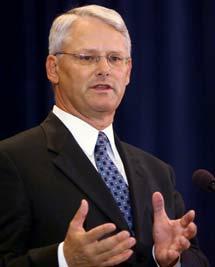The only government in North America to implement a carbon tax to fight climate change has been re-elected handily in British Columbia.
Liberal Premier Gordon Campbell introduced a carbon tax in February 2008 and launched it officially in July, regardless that the introduction date coincided with the highest oil prices in history. The Premier, surprisingly, held his ground, The left-leaning (and traditionally environmentally conscious) New Democratic Party on the other hand opted to attack the tax, characterizing it as an unfair effort to pick the pockets of the poor. She campaigned on a promise to “axe the tax.”
On Tuesday, British Columbians said, loudly, that they couldn’t believe her. The carbon tax stands; Carole James falls.There were, of course, many other issues in the election, probably none larger than the economy. But the carbon tax was important on two counts. First, it affected voters who might traditionally have been expected to vote NDP. Environmental leaders like Dr. David Suzuki (of the influential David Suzuki Foundation) and PowerUp Canada founder Tzeporah Berman stood up for the Liberals’ tax (even if they didn’t quite stand up for the Liberals) and offered harsh criticism of the NDP for its political opportunism in opposing the policy.
And that focuses the second issue. The New Democrats’ choice, to play politics on this important issue, critically undermined public faith in the party’s credibility at a time when faith in politicians is already at an all-time low. The polls showed a fair amount of skepticism of the Liberals and Liberal leader Gordon Campbell has never been a particulary public favorite. But people looked at the alternative – they looked especially at the ease with which the New Democrats trashed a policy that they had previously supported, apparently because they thought there was political room to be gained – and they chose to stick with the devil they knew.
We can only hope now that the New Democrats will recognize their error and close the gap with their erstwhile environmental supporters. We hope they will change their policy and support the carbon tax – in fact, that they will demand the tax be increased quickly to a level at which it is truly effective.
We also hope that other political leaders in other jurisdictions will look at what has happened here in B.C. and start pursuing aggressive, promising climate change policies. A handsome cross section of international economists have said that a carbon tax can work. Now, a group of voters have said that a carbon tax can win political support. That’s a promising step toward a stable climate future.
In his acceptance speech Tuesday night, Premier Campbell mentioned the carbon tax and said that British Columbians had recognized that good climate policy and good economic policy can be mixed effectively. He said: “It can be done, it should be done and it must be done for the children of British Columbia.”
Well, there are children everywhere and it can be done, it should be done and it must be done for them as well. Hurry the day.
Subscribe to our newsletter
Stay up to date with DeSmog news and alerts






